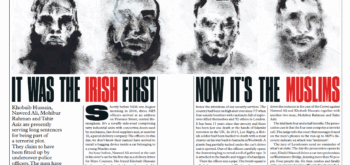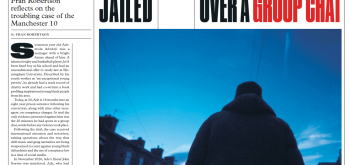The reaction of the mainstream UK press to Tuesday’s announcement of an agreement on regulation was as predictable as some of it was misleading, writes Juliet Shaw.
- In 2003 Juliet Shaw received a request from a freelance journalist writing for the Daily Mail to take part in a feature about the benefits of moving from city to the country. The article ran in the Femail section of the Daily Mail in September 2003 (‘Sex and the country. What happened when four singletons, fed up with shallow urban lives, upped sticks for rural romance.’) Juliet was appalled by the resulting article. It bore little or no relationship to her reality or the interview.
- You can read Juliet’s account of what happened; about the impact a deliberately misleading article had on the life of an ordinary person; and her ensuing battle for justice on the No Sleep ‘Til Brooklands blog here and here on the JusticeGap.
- Sketch by Isobel Williams. You see more of Isobel’s drawings at www.izzybody.blogspot.co.uk.
The Daily Mail wailed of a ‘threat to free speech,’ while The Sun announced the agreement would ‘give an all-powerful quango a major say on the content of newspapers.’ The Guardian, meanwhile, gave a cautious welcome to the deal and the Independent announced it a ‘deal worth backing.’
It’s worth comparing these reactions with the latest figures from the Press Complaints Commission. Although derided and soon to be defunct, the PCC continues to monitor complaints, of which 586 were concluded in January. Of the total complaints looked at, The Daily Mail was the subject of 143 complaints, The Sun 114. The Independent logged 10, with the Guardian receiving eight.
With this in mind, let’s look again at the claims in reaction to the deal. The Sun claims that ‘an all powerful quango’ will have a ‘major say on the content of newspapers.’ The Mail claims the deal is a ‘press regulatory regime of fiendish complexity, with layer upon layer of bureaucracy,’ and includes a handily complicated flowchart.
The facts say otherwise.
Between four and eight members of an independent ‘recognition panel’ (to include one member with a legal background, one with financial expertise and one expert in public policy) will appoint a board to govern an independent self-regulatory body.
The board of the regulatory body will consist of 12 members, none of whom are to be serving editors and six of whom should have no connection to the Press at all. All appointments will be made in a clear and transparent manner.
The regulatory body will be responsible for overseeing a new standards code to be developed by independent members, editors and journalists. The code will balance the need for freedom of speech with the interests of the public and the rights of journalists to protect sources. Specifically, it will cover standards of journalists’ conduct, respect for privacy where there is no sufficient public interest, accuracy and misrepresentation.
When the code is breached, the regulatory body will deal with complaints free of charge and negotiate remedies if a breach is found. The board has the power to direct the nature, extent and placement of corrections and apologies and impose sanctions, including fines, for ‘serious or systemic breaches.’
What the board won’t do, as clearly laid out in the charter, is ‘have the power to prevent publication of any material, by anyone, at any time.’
There is no threat to a free press with this charter. It’s a move away from serving editors adjudicating on complaints against their peers; it’s a commitment to a clear and independent process from the top down; it’s the creation of a body that can curtail the toxic practices of some sections of the British media and, importantly, impose sanctions on those who refuse to comply.
The hysterical reporting of some sections of the media would have you believe otherwise; I suggest those who attempt to scaremonger and mislead are those with the most to hide.








A detailed critique of the Court of Appeal judgment in the case of Oliver Campbell